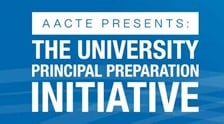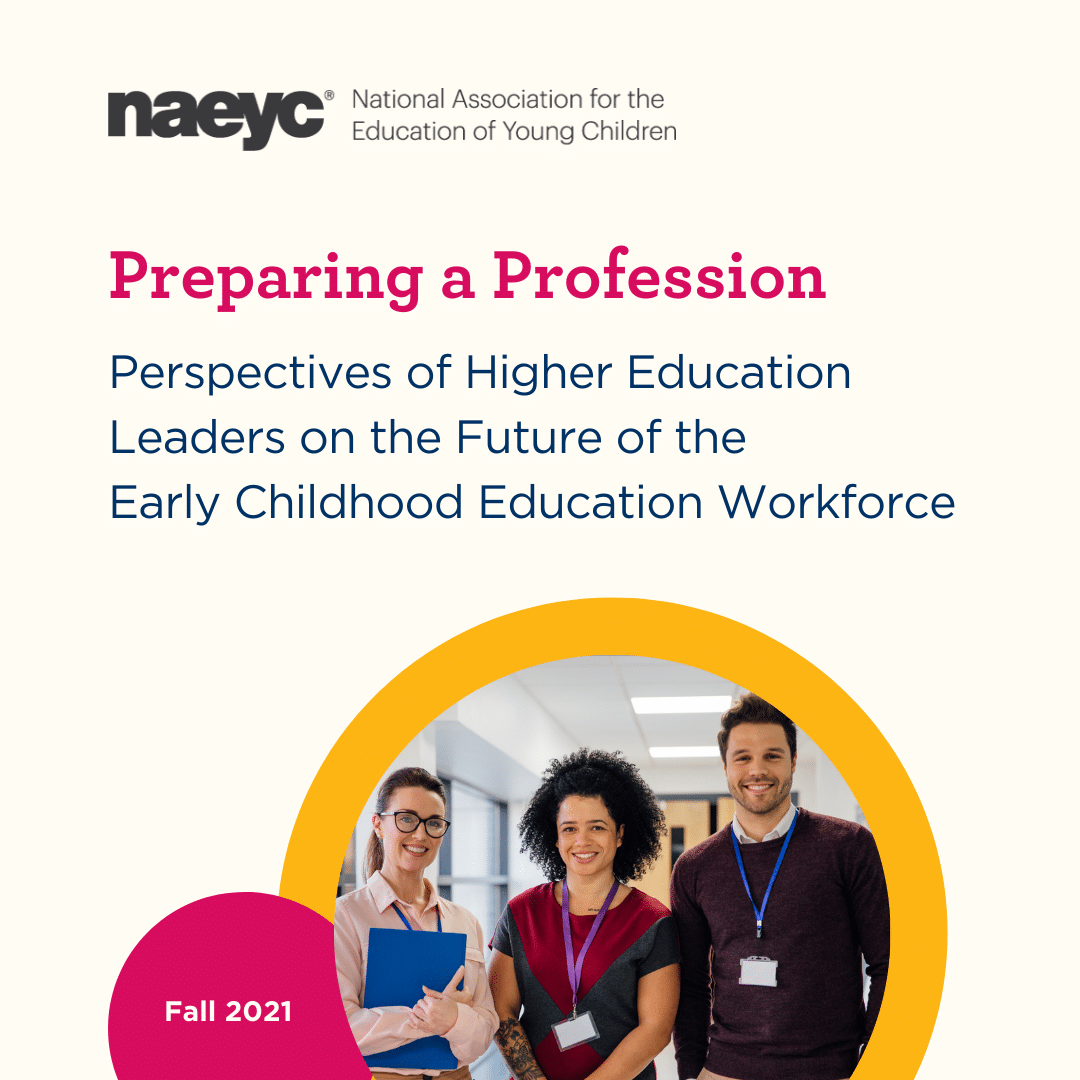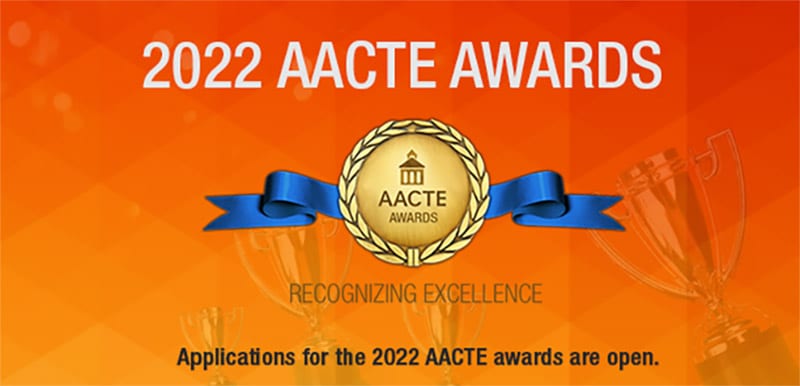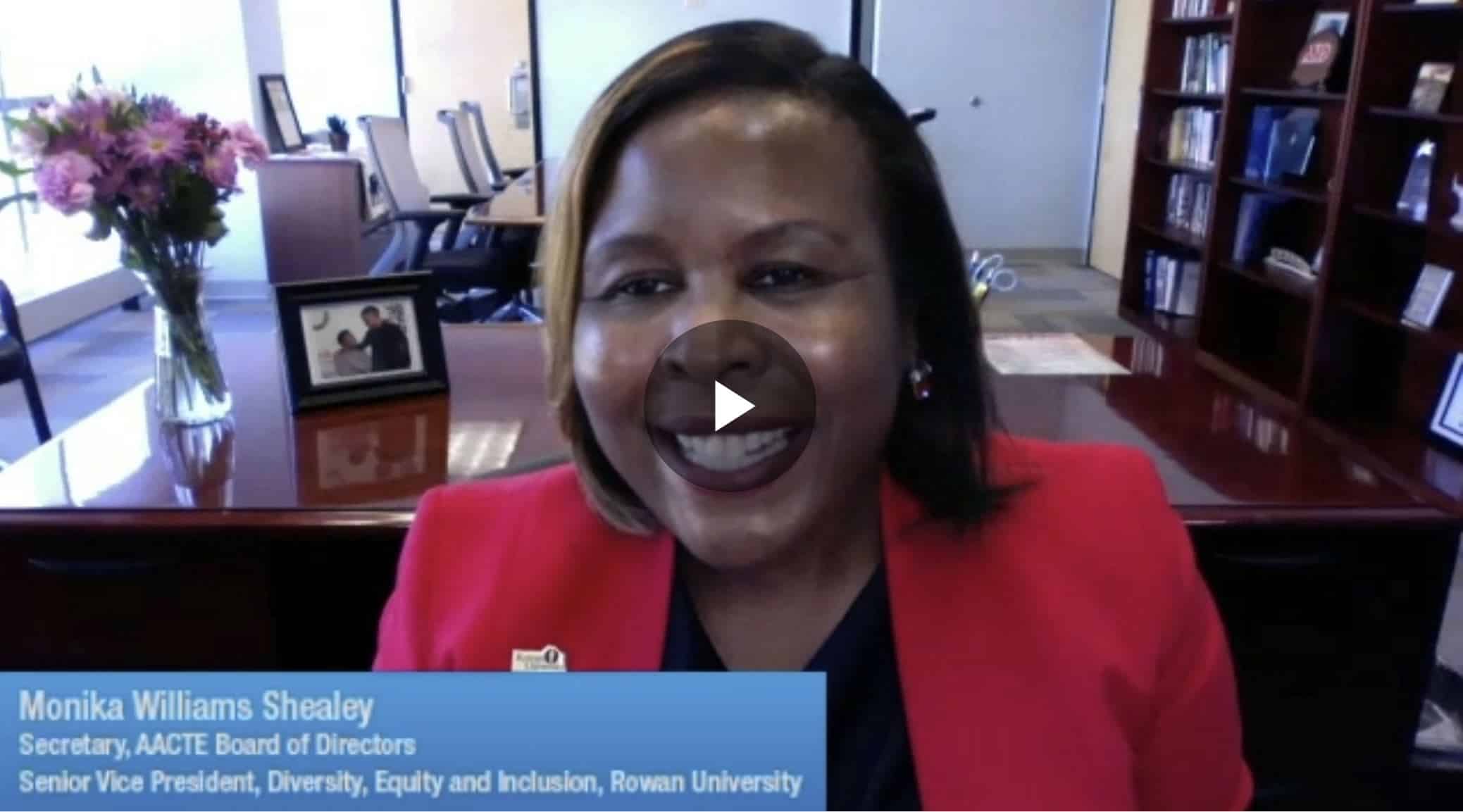05 Nov2021
By Nicole Dunn
 AACTE has released a new podcast series that chronicles the multi-year principal program redesign initiative undertaken by the Wallace Foundation: The University Principal Preparation Initiative (UPPI). This podcast is designed to inspire learning opportunities and educational partnerships among AACTE members and stakeholders and to create highly trained and qualified principals who will influence and shape their learning communities.
AACTE has released a new podcast series that chronicles the multi-year principal program redesign initiative undertaken by the Wallace Foundation: The University Principal Preparation Initiative (UPPI). This podcast is designed to inspire learning opportunities and educational partnerships among AACTE members and stakeholders and to create highly trained and qualified principals who will influence and shape their learning communities.
In the first episode, AACTE interviews Rochelle Herring, senior program officer at the Wallace Foundation, to introduce the initiative, though which seven principal preparation programs were selected to partner with district and state leaders in their redesign efforts, as well as investigate how state policy could be leveraged to improve the quality of principal preparation statewide. Throughout the conversation, Herring cites research proving that the principal is a multiplier of good teaching and therefore, improved learning.
03 Nov2021
By Michael Dantley

I have had the pleasure of serving in several leadership positions within AACTE and, beginning in March 2022, will serve as chair of the AACTE Board of Directors. These have been busy and challenging times for all of us, and AACTE’s volunteer leaders have been working hard with President & CEO Lynn M. Gangone and the entire National Office team to ensure that AACTE is well positioned to advance its vision of revolutionizing education for all learners. A sample of the board’s recent activities include the following:
- Establishing a new strategic plan for the Association, including new strategic priorities on advocacy, DEI, and educator preparation policy, practice, and research
- Completing a successful sale of AACTE’s office building in Washington, DC and investing a portion of the proceeds in new technology platforms to better serve members
- Updating AACTE’s governance structure to reflect best practices in non-profit management
- Advising the National Office team on AACTE’s response to COVID-19
03 Nov2021
By Jacqueline Rodriguez
 Higher education is a critical part of the early childhood education (ECE) profession as it serves as the primary pipeline for the early childhood education workforce. And, like early childhood educators, most ECE higher education programs find themselves under-resourced and under-valued. As such, the Unifying Framework for the Early Childhood Education Profession calls for a significant investment in ECE higher education programs to shore up the ECE workforce pipeline and to ensure that practitioners are equipped with the necessary knowledge and skills to effectively support the development and education of young children.
Higher education is a critical part of the early childhood education (ECE) profession as it serves as the primary pipeline for the early childhood education workforce. And, like early childhood educators, most ECE higher education programs find themselves under-resourced and under-valued. As such, the Unifying Framework for the Early Childhood Education Profession calls for a significant investment in ECE higher education programs to shore up the ECE workforce pipeline and to ensure that practitioners are equipped with the necessary knowledge and skills to effectively support the development and education of young children.
02 Nov2021
By Linda Minor
 The annual AACTE call for award nominations has been extended through November 19. This means you still have time to nominate a colleague who has made a significant impact on educator preparation for the 2022 Margaret B. Lindsey Award, David G. Imig Award, or Edward C. Pomeroy Award. AACTE will honor the 2022 award recipients at the 74th Annual Meeting in New Orleans, March 4-6.
The annual AACTE call for award nominations has been extended through November 19. This means you still have time to nominate a colleague who has made a significant impact on educator preparation for the 2022 Margaret B. Lindsey Award, David G. Imig Award, or Edward C. Pomeroy Award. AACTE will honor the 2022 award recipients at the 74th Annual Meeting in New Orleans, March 4-6.
These professional achievement awards honor individuals who have made a meaningful contribution to the educator preparation profession with their research, policy leadership, or other service to the community. I hope you will take this opportunity to help AACTE recognize one of your peers for similar contributions to the field and profession.
02 Nov2021
By Leslie Reed
 Western Governors University’s (WGU) Teachers College will mark the National Education Association’s (NEA) 2021 American Education Week Nov. 15-19 by announcing its WGU Loves Teachers and Become a Teacher scholarship programs, together totaling $6 million, for current and future education professionals who wish to pursue bachelor’s or master’s degree programs in the Teachers College.
Western Governors University’s (WGU) Teachers College will mark the National Education Association’s (NEA) 2021 American Education Week Nov. 15-19 by announcing its WGU Loves Teachers and Become a Teacher scholarship programs, together totaling $6 million, for current and future education professionals who wish to pursue bachelor’s or master’s degree programs in the Teachers College.
01 Nov2021
By Maria Hyler
 Strong pre-K–12 partnerships are vital to high quality educator preparation. To ensure a diverse, effective, and sustainable educator workforce, it is important that preparation programs and district partners develop and nurture authentic, reciprocal partnerships. These cross-institutional relationships are more important than ever in the wake of the isolation and disruption caused by the pandemic. Effective partnerships are complex and require intentional structures, dedicated resources, and shared goals and values.
Strong pre-K–12 partnerships are vital to high quality educator preparation. To ensure a diverse, effective, and sustainable educator workforce, it is important that preparation programs and district partners develop and nurture authentic, reciprocal partnerships. These cross-institutional relationships are more important than ever in the wake of the isolation and disruption caused by the pandemic. Effective partnerships are complex and require intentional structures, dedicated resources, and shared goals and values.
01 Nov2021
By Monika Williams Shealey
 Thank you, American Association of Colleges for Teacher Education for being an AACTE member. As a member-driven association, both the Board of Directors and National Office staff greatly appreciate your contributions, participation, feedback, and overall support of AACTE.
Thank you, American Association of Colleges for Teacher Education for being an AACTE member. As a member-driven association, both the Board of Directors and National Office staff greatly appreciate your contributions, participation, feedback, and overall support of AACTE.
Your association prides itself in providing the tools and resources needed today. A few of the recent and upcoming, members-only, AACTE resources available to you, your colleagues, and students include the following:
01 Nov2021
By Linda Minor

We look forward to collaborating with you as we “Rethink, Reshape, Reimagine, and Revolutionize” our profession post-pandemic.
01 Nov2021
By Jacqueline E. King, Ph.D.
The annual election for the
AACTE Board of Directors is now open and runs through
November 30. This year, there are 12 individuals running for 2 at-large seats and for seats representing AILACTE, HACU, NAFEO, and TECSCU. In addition, members are asked to ratify a set of proposed technical changes to the Articles of Incorporation & Bylaws.
If you are an official AACTE Institutional or Chief Representative, click
here to enter the online voting system for the Board election. There you will find short statements from each candidate and the proposed changes to the Articles of Incorporation & Bylaws. To review these documents in advance, visit
aacte.org.
29 Oct2021
By Kimberly White Smith and Jacob Easley II
This op-ed originally appeared in Diverse Issues in Higher Education and is reprinted with permission.

Kimberly White-Smith and Jacob Easley
I love America more than any other country in the world and, exactly for this reason, I insist on the right to criticize her perpetually. – James Baldwin
The momentum of social and racial justice fueled by recent events finds us at a significant crossroad with divergent paths—one path opening to opportunity and one leading to entropy. The approach we choose to follow will affect society and the lives of many for generations to come. Should we choose the way of opportunity, we must seriously grapple with the debates and our commitment to preserving a true democracy. Should we select the other, we accept the deterioration of hard-earned civil rights—choosing to abdicate to systems, laws, and politics that have historically disadvantaged those unable to make a living wage and people of color. As deans of educator preparation programs who work closely with the nation’s two largest school districts (New York City Department of Education and Los Angeles Unified School District), we understand the relevance of education. It is the core vehicle for liberatory practice and for championing American democracy. If education is the road to national mobility, and we believe it is, we must preserve the mechanisms and freedoms to critique and examine the governing structures of our society.
28 Oct2021
By Michael Rose

AACTE expressed its strong support and appreciation for the historic funding for educator preparation programs included in President Joseph Biden’s Build Back Better framework, which was released today. This funding will help ensure that our nation’s classrooms are led by profession-ready and diverse educators. AACTE strongly urges Congress to pass this legislation as quickly as possible to help address the shortage of educators our nation has been experiencing and that has gotten worse in recent years.
27 Oct2021
By Ward Cummings

Last year, the AACTE Board of Directors created a State Chapter Taskforce to study the relationship between the national office and its state affiliates. After a year-long, wide-ranging set of discussions with state leaders to determine how the relationship between AACTE and state associations could be strengthened, the State Chapter Taskforce released its recommendations.
Over the summer, the Taskforce delivered the recommendations related to communication, advocacy, and governance that were endorsed by the AACTE Board of Directors. One of the recommendations was to implement new state association agreements that affirm the benefits of collaboration between AACTE and state associations; provide maximum flexibility and autonomy for state associations; protect the interests of AACTE and its members; and update and standardize agreements across all states.
27 Oct2021
By Ward Cummings
 AACTE continues to work with its national coalition partners toward enhancing and improving the state of education and the educator preparator profession in the United States. To that end, the Association added its voice this month to the chorus of supporters of the Biden Administration’s Build Back Better education agenda.
AACTE continues to work with its national coalition partners toward enhancing and improving the state of education and the educator preparator profession in the United States. To that end, the Association added its voice this month to the chorus of supporters of the Biden Administration’s Build Back Better education agenda.
In a letter to congressional leaders who are currently engaged in negotiating the elements of the president’s budget package, AACTE expressed its specific support for a key higher education component of the Building Back Better agenda: America’s College Promise. Contained within America’s College Promise is a historic, first-of-its-kind tuition-free community college program; an increase to the Pell Grant; and a retention and completion grant program.
26 Oct2021
By AACTE

The Consortium for Research-Based and Equitable Assessments (CREA) at the American Association of Colleges for Teacher Education has released its first report, The History, Current Use, and Impact of Entrance and Licensure Examinations Cut Scores on the Teacher of Color Pipeline: A Structural Racism Analysis. The CREA project, funded by the Bill & Melinda Gates Foundation, engages 14 states in examining their cut score setting process for entrance examinations into teacher preparation programs. The recent report chronicles the history of teacher preparation entrance and exit assessments and their impact on the diversity of candidates pursuing teaching as a profession.
The report’s author, Leslie T. Fenwick, AACTE dean in residence (who is also a former School of Education dean), discusses in detail the intentional misuse of entrance licensure examinations after the Brown v. Board of Education (BOE) decision in 1954. According to Fenwick, there is a little-known history associated with how licensure examinations were created after Brown to block integration of Black teachers into desegregating schools:
25 Oct2021
By Shea Kerkhoff, Shannon Tanghe and Tara Mathien
Our world is changing rapidly as cultures, ideas, conflicts, and viruses transcend borders. The global pandemic COVID-19 highlighted the multitude of ways the world is interconnected socially, technologically, environmentally, economically, and politically. Local-level responses alone have not been enough to mitigate the virus. The World Health Organization and United Nations have called for global coordination, information sharing, and most importantly, global solidarity to solve the crisis. As such, COVID-19 also illustrates the importance of globally competent teaching to build global solidarity, combat xenophobia, understand global systems, cut through misinformation, learn from other countries, and respond with empathy. Globally competent teaching prepares students to communicate and collaborate across borders in an effort to solve global challenges.
Figure 1. Created by authors in Piktochart.

 AACTE has released a new podcast series that chronicles the multi-year principal program redesign initiative undertaken by the Wallace Foundation: The University Principal Preparation Initiative (UPPI). This podcast is designed to inspire learning opportunities and educational partnerships among AACTE members and stakeholders and to create highly trained and qualified principals who will influence and shape their learning communities.
AACTE has released a new podcast series that chronicles the multi-year principal program redesign initiative undertaken by the Wallace Foundation: The University Principal Preparation Initiative (UPPI). This podcast is designed to inspire learning opportunities and educational partnerships among AACTE members and stakeholders and to create highly trained and qualified principals who will influence and shape their learning communities. 


 Higher education is a critical part of the early childhood education (ECE) profession as it serves as the primary pipeline for the early childhood education workforce. And, like early childhood educators, most ECE higher education programs find themselves under-resourced and under-valued. As such, the
Higher education is a critical part of the early childhood education (ECE) profession as it serves as the primary pipeline for the early childhood education workforce. And, like early childhood educators, most ECE higher education programs find themselves under-resourced and under-valued. As such, the  The annual AACTE call for award nominations has been extended through November 19. This means you still have time to nominate a colleague who has made a significant impact on educator preparation for the 2022 Margaret B. Lindsey Award, David G. Imig Award, or Edward C. Pomeroy Award. AACTE will honor the 2022 award recipients at the 74th Annual Meeting in New Orleans, March 4-6.
The annual AACTE call for award nominations has been extended through November 19. This means you still have time to nominate a colleague who has made a significant impact on educator preparation for the 2022 Margaret B. Lindsey Award, David G. Imig Award, or Edward C. Pomeroy Award. AACTE will honor the 2022 award recipients at the 74th Annual Meeting in New Orleans, March 4-6. Western Governors University’s (WGU) Teachers College will mark the
Western Governors University’s (WGU) Teachers College will mark the  Strong pre-K–12 partnerships are vital to high quality educator preparation. To ensure a diverse, effective, and sustainable educator workforce, it is important that preparation programs and district partners develop and nurture authentic, reciprocal partnerships. These cross-institutional relationships are more important than ever in the wake of the isolation and disruption caused by the pandemic. Effective partnerships are complex and require intentional structures, dedicated resources, and shared goals and values.
Strong pre-K–12 partnerships are vital to high quality educator preparation. To ensure a diverse, effective, and sustainable educator workforce, it is important that preparation programs and district partners develop and nurture authentic, reciprocal partnerships. These cross-institutional relationships are more important than ever in the wake of the isolation and disruption caused by the pandemic. Effective partnerships are complex and require intentional structures, dedicated resources, and shared goals and values.





 AACTE continues to work with its national coalition partners toward enhancing and improving the state of education and the educator preparator profession in the United States. To that end, the Association added its voice this month to the chorus of supporters of the Biden Administration’s Build Back Better education agenda.
AACTE continues to work with its national coalition partners toward enhancing and improving the state of education and the educator preparator profession in the United States. To that end, the Association added its voice this month to the chorus of supporters of the Biden Administration’s Build Back Better education agenda.
